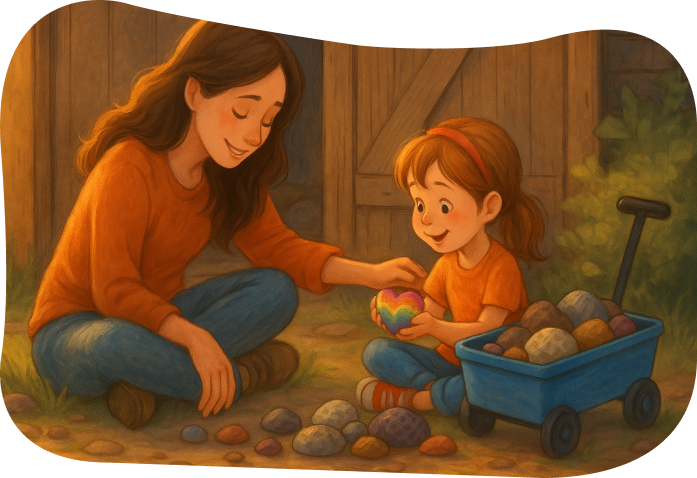
Have you ever noticed how a child’s voice can carry truths that adults often forget? Sometimes, in the middle of our busyness, a little one will tug on our sleeve with a treasure in hand—be it a rock, a drawing, or a thought—and in that moment, we are given a choice. We can brush it aside, or we can lean in, listen, and recognize the weight of that child’s world. Karen R. Sullivan’s children’s book The Blue Wagon reminds us that listening to children is not only a gift to them—it is a promise we keep as parents, caregivers, and mentors. And in that promise lies the heart of love, trust, and understanding. At the focus of The Blue Wagon is Heather, a six-year-old with bright curiosity and a knack for collecting treasures. One day, she sets out with her little blue wagon, determined to fill it with meaningful finds. Along the way, she discovers rocks—some plain, some sparkling, and even one given to her by her kind neighbor, Mr. Wiggledimp. To Heather, each rock is a treasure, chosen with joy and placed carefully in her wagon.
But as the day goes on, the wagon grows heavier, and Heather grows weary. Her simple treasure hunt begins to mirror something much larger: the way burdens accumulate in our lives. Heather does not yet have words for it, but her journey becomes a quiet metaphor for the emotional and spiritual weights we all carry. When Heather returns home, eager to share her discoveries, she runs to her mother. But like many adults pressed with responsibility, her mother is tired and busy with dinner. At first, she tells Heather to wait. Later, after dishes are done and the evening slows, she finally looks at Heather’s treasures. It is in this moment that Sullivan delivers her most poignant lesson: what matters most to children is not that we see their rocks—it’s that we listen to their hearts. Heather’s mother could have dismissed her daughter’s excitement entirely. But she didn’t. She made a promise by her actions: she eventually sat down, walked with Heather to the shed, and looked at the treasures. In doing so, she validated Heather’s day, her effort, her joy, and even her struggles pulling the heavy load.
Listening to children is never just about words. In The Blue Wagon, it is about presence. Heather wanted her mother not simply to look but to see. Every child longs for this—to know their discoveries, fears, or joys matter to someone who loves them. Listening, then, is a promise of love. It tells the child: You are seen, you are valued, you are heard. Sullivan also layers in a stronger allegory. Heather’s wagon, heavy with rocks, becomes a mirror for the weight of worry that adults carry. When Heather asks why her mother seems so tired, her mother gently explains that grown-ups, too, have wagons filled with burdens—only theirs are made up of worries and thoughts instead of rocks. This is where listening becomes transformative. By paying attention to Heather, her mother is not only teaching but also admitting her own humanity. She shows Heather that burdens are real, but they can be shared. And in doing so, she models vulnerability and trust.
Another important layer comes through Mr. Wiggledimp, the elderly neighbor who gifts Heather one of his most cherished rocks. In a world where adults often rush past children, he pauses, notices her, and invests kindness into her small adventure. Sullivan uses him to show us the lasting impact of listening adults outside the immediate family. Neighbors, teachers, and mentors can all play the role of Mr. Wiggledimp, reminding us that children flourish when kindness and attention are given freely. His gift teaches Heather that treasures are not always about value in the eyes of the world but about the meaning they hold for the heart. And in giving her his pet rock, he too keeps a promise—the promise of taking her seriously, even at six years old. Though The Blue Wagon is a children’s story, its message connects greatly with adults. The book suggests something important: this is also a story for the “adult inner child.” Each of us once pulled a wagon filled with our own treasures. Each of us once longed for someone to notice them. And many of us still carry that longing today.
By reading Heather’s story, adults are invited to reflect: What burdens am I still pulling in my own wagon? Did someone listen to me when I was Heather’s age? Do I listen now to the children in my life? These questions open the door for healing, compassion, and the rediscovery of childlike wonder. When Sullivan writes that we must “notice children as opposed to seeing and not hearing them,” she touches on a crucial truth. Children who feel unseen can grow into adults who struggle with worth and voice. But when we honor their words and their treasures, we plant seeds of confidence, love, and resilience. Listening is not a casual act—it is a commitment. It requires slowing down, setting aside distractions, and opening our hearts. It is a promise that says, You matter to me, enough for me to stop and listen.
Quick Links
Useful Links
Copyright © 2025 Karen Sullivan. All Rights Reserved.